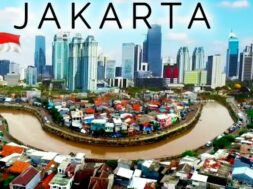
Roving Periscope: Overpopulation, climate change, force Indonesia to shift capital
Virendra Pandit
New Delhi: The world’s largest archipelago forming a single state, Indonesia, home to over 280 million population, nearly 13 percent of the Muslims on the planet, is all set to shift its capital from Jakarta 2,000 km away to the Borneo Islands—all because of congestion of Jakarta and climate change.
Indonesia consists of five main islands and 30 smaller archipelagoes, totaling about 18,110 islands and islets, of which about 6,000 are inhabited.
Its national capital Jakarta, home to over 40 million population (including the greater metropolitan area) is highly congested, polluted, prone to temblors, and is sinking into the Java Sea. This has forced the government to relocate the capital, the media reports said.
Jakarta is seen as the world’s most rapidly sinking city, one-third of which might be submerged completely by 2050.
The new capital will be a “sustainable forest city” and aims to be carbon-neutral by 2045. But environmentalists apprehend it might cause massive deforestation, and threaten the habitat of endangered species, such as orangutans, a major tourist attraction. Besides, the national capital’s relocation could imperil the homes of Indigenous communities in Borneo.
Jakarta is plagued with uncontrolled groundwater extraction, exacerbated by the rising Java Sea because of climate change.
The national capital’s air and groundwater are heavily polluted, and its streets flood regularly. This congestion costs the Indonesian economy a whopping USD 4.5 billion a year.
President Joko Widodo believes only a relocation of the national capital away from Jakarta could reduce its population and make Indonesia restart with a new capital, a sustainable city.
He plans to establish the city of Nusantara, an old Javanese term meaning archipelago at Borneo, which would envisage constructing government buildings and housing from scratch.
The media reported that an estimated 1.5 million civil servants would have to be relocated to Nusantara, northeast of Jakarta—a distance of nearly 2,000 km. The new capital city is likely to have a 65 percent forest cover.
It is expected to be inaugurated on August 17, 2024, to coincide with Indonesia’s Independence Day and its final stages may be over by 2045, marking the country’s 100th anniversary.
But worried environmentalists say the environmental impact of building a sprawling 256,000-hectare (990-square-mile) city down in Borneo’s East Kalimantan province, which is home to orangutans, leopards, and a wide array of other wildlife, could be massive.
Forest Watch Indonesia, an Indonesian nongovernmental organization that monitors forestry issues, warned in November 2022 that most of the forested areas in the new capital are production forests, which means permits could be granted for forestry and extractive activities that would lead to further deforestation.
Besides, the new capital will force the relocation of at least five villages with over 100 Indigenous Balik people because of the construction activity. More villages could also be uprooted likewise as the building site expands.
According to officials, the government has provided compensation to those whose land is being acquired or used for the new city. Also, local community leaders have supported the new capital.













